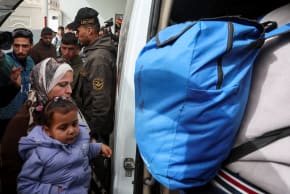Rafah border crossing
Israel-aligned Gazan militia operating in Rafah tunnels, aim to disarm Hamas - report
Abu Shabab, named for their founder, Yasser Abu Shabab, is an anti-Hamas, Israel-aligned resistance group operating within the Gaza Strip.


US Ambassador Huckabee says Rafah is opening slowly to not 'bring terrorists in, or take them out'

Palestinian women describe harsh questioning, 'journey of horror’ crossing back into Gaza

Five Gazan patients evacuated via newly-opened Rafah crossing in first since 2025
IDF seizes Hamas weapons stored in school in southern Gaza
In the past 24 hours, the IAF carried out airstrikes targeting approximately 35 sites throughout the Gaza Strip.

EU border monitors deploy to Rafah Crossing to monitor security
The initial opening was intended to be on Sunday, day 14 of the hostage-ceasefire deal.

Rafah Crossing to re-open Friday, terrorists among those to leave
The border crossing is being opened earlier than expected due to the release of hostages on Thursday, which was not originally in the agreement.

Rafah redux: Will EU Rafah mission be effective? - analysis
“Everyone agrees that EUBAM Rafah can play a decisive role in supporting the ceasefire," said EU High Representative Kaja Kallas.

IDF destroyed 80% of Hamas's tunnels in Rafah, military sources claim
Despite military sources previously stating it could take six months, on Thursday, IDF sources claimed that 80% of the network had been destroyed.

Egypt to hand Hamas a proposal for Philadelphi and Rafah
Egyptian officials will give Hamas a proposal regarding the Philadelphi Corridor and the Rafah Crossing, hoping to resolve the issue before Sunday's summit.

A ceasefire deal: What would be the Israeli demands in it? - KAN
The White House set the date for further talks for Thursday in the hope that there would be more significant flexibility on both sides for a deal.

Cairo hostage negotiations show progress, despite tepid atmosphere - report
According to senior officials familiar with the negotiations for the deal, a meeting held in Cairo led to progress in the parameters related to the Philadelphi Corridor and the Rafah crossing.

How Israel manages Gaza aid: 'Post' journeys to key crossings
Hamas still controls 100% of humanitarian aid and why replacing UNRWA without Day After plan meant nothing

Rafah border crossing can't reopen unless Israeli forces quit Gaza side, Egypt says
Tensions rise around talks of reopening the Rafah border crossing between Gaza and Egypt. Last month, Israel seized Gaza's border with Egypt during its offensive against Hamas.
